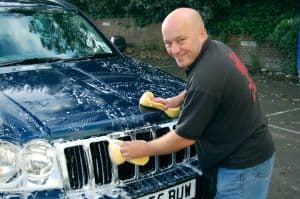The verbs DO and MAKE are often confusing to English language learners because in many other languages they are not 2 separate verbs.
In this lesson, you will learn the difference between DO and MAKE and when to use them.
DO
past tense: “did”
past participle: “done”
We use “do” to describe work, a specific job or task.
Examples:
Jane did the shopping yesterday.
I am doing the ironing.
Helen is doing the washing up.
We use “do” to describe non-specific activities or actions.
Example words: thing, something, anything, nothing, what, everything
Examples:
Mark likes doing nothing on weekends.
I am bored. Let’s do something.
We use “do” to replace another verb if the meaning is clear.
Examples:
I am not ready. I have to do my hair. (“do” is clearly replacing “brush”)
I’ll do the bathroom if you do the car. (“do” is clearly replacing “clean”)

Expressions with “do”
There are many words and expressions which only use “do”. They don’t use “make”. Here is the list of the most common ones:
anything – Today we are allowed to do anything we want.
assignment – Has she done the assignment?
best – Winning isn’t important. Do your best.
business – I hope that our companies can do business together.
chores – Do your chores before going to bed.
course – Jane is doing an accounting course at University.
crossword – I love doing crosswords.
damage – The storm did damage to the car.
dishes – He is going to do the dishes later.
drawing – I’m going to do a drawing of the lake.
everything – Have you done everything I asked?
exercises – Please do those exercises for your homework.
favour – Will you do me a favour please?
gardening – I enjoy doing the gardening in the summer.
good – Charities do a lot of good for people.
hair – I have to do my hair before going out.
harm – Stop complaining. He isn’t doing any harm.
homework – She is in her bedroom doing her homework.
housework – I hate doing the housework.
ironing – I want to employ someone to do the ironing.
job – Do your job and stop complaining!
laundry – We will do the laundry tomorrow.
nails – Would you like me to do your nails?
nothing – You are very lazy. You do nothing all day.
project – I must do this project before the end of the year.
research – The company does medical research.
service – Thank you, you have done me a great service.
shopping – I did the Christmas shopping yesterday.
something – David, stop yawning and do something please.
teeth – Children, do your teeth and go to bed immediately!
washing – Please do the washing before playing video games.
work – I must do some work before I go to bed.
MAKE
past tense: “made”
past participle: “made”
We use “make” to describe the creation of something.
Examples:
Clare has made a beautiful dress.
My father made a toy car.
We use “make” to describe the preparation of food or drinks.
Examples:
She is making a coffee.
Steven has made a sandwich.

Expressions with “make”
There are many words and expressions which only use “make”. They don’t use “do”. Here is the list of the most common ones:
announcement – Today the Queen made an important announcement.
appointment – I am going to make an appointment with my dentist.
bed – I make my bed every morning.
bet – I have made a bet for England to win the World Cup.
change – The new CEO has made lots of changes to the company.
choice – Please make your choice.
comment – Please make a comment about my lessons. 🙂
complaint – The service was terrible. I am going to make a complaint.
decision – Mark has made a decision to leave my job.
effort – I am pleased that he has made an effort to work harder.
excuse – Stop making excuses!
fortune – Bill Gates is very rich. He has made a fortune.
friend – I hope I make some friends at school.
impression – My manager likes me. I made a good first impression.
joke – My dad is always making bad jokes.
list – Make a list of your favourite foods.
loss – The company made a loss of $75,000 last year.
love – We made love for the first time during our honeymoon.
meal – She made a nice meal for her parents.
mess – My children always make a mess with their toys.
mistake – I am sorry. I made a mistake.
money – Justin Bieber makes lots of money.
noise – Please be quiet. You are making too much noise.
offer – They made an offer to buy the car.
peace – Let’s stop arguing and make peace.
phone call – I must make an important phone call today.
plan – I want to make a plan for my future.
point – I agreed with him. He made a good point.
profit – Last year we made a profit of £50,000
progress – The company is making excellent progress.
promise – I made a promise to my wife.
reservation – He made a reservation at the Hilton hotel in London.
sound – Please don’t make a sound in the library!”
speech – The Prime Minister made an excellent speech yesterday.
statement – He made a statement to the media.
suggestion – Madam, could I make a suggestion?
More lessons
MUCH and MANY (determiners)
How to get a band 8 in the IELTS exam
FOR and DURING – English prepositions
Expressions and phrasal verbs with TAKE


calvario says
I liked this page and it will be helpful for me.